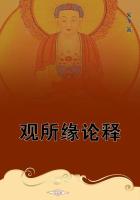"That's true," said Grandet, "but your loaves weigh six pounds;there'll be some left. Besides, these young fellows from Paris don't eat bread, you'll see.""Then they must eat /frippe/?" said Nanon.
/Frippe/ is a word of the local lexicon of Anjou, and means any accompaniment of bread, from butter which is spread upon it, the commonest kind of /frippe/, to peach preserve, the most distinguished of all the /frippes/; those who in their childhood have licked the /frippe/ and left the bread, will comprehend the meaning of Nanon's speech.
"No," answered Grandet, "they eat neither bread nor /frippe/; they are something like marriageable girls."After ordering the meals for the day with his usual parsimony, the goodman, having locked the closets containing the supplies, was about to go towards the fruit-garden, when Nanon stopped him to say,--"Monsieur, give me a little flour and some butter, and I'll make a /galette/ for the young ones.""Are you going to pillage the house on account of my nephew?""I wasn't thinking any more of your nephew than I was of your dog,--not more than you think yourself; for, look here, you've only forked out six bits of sugar. I want eight.""What's all this, Nanon? I have never seen you like this before. What have you got in your head? Are you the mistress here? You sha'n't have more than six pieces of sugar.""Well, then, how is your nephew to sweeten his coffee?""With two pieces; I'll go without myself."
"Go without sugar at your age! I'd rather buy you some out of my own pocket.""Mind your own business."
In spite of the recent fall in prices, sugar was still in Grandet's eyes the most valuable of all the colonial products; to him it was always six francs a pound. The necessity of economizing it, acquired under the Empire, had grown to be the most inveterate of his habits.
All women, even the greatest ninnies, know how to dodge and dodge to get their ends; Nanon abandoned the sugar for the sake of getting the /galette/.
"Mademoiselle!" she called through the window, "do you want some /galette/?""No, no," answered Eugenie.
"Come, Nanon," said Grandet, hearing his daughter's voice. "See here."He opened the cupboard where the flour was kept, gave her a cupful, and added a few ounces of butter to the piece he had already cut off.
"I shall want wood for the oven," said the implacable Nanon.
"Well, take what you want," he answered sadly; "but in that case you must make us a fruit-tart, and you'll cook the whole dinner in the oven. In that way you won't need two fires.""Goodness!" cried Nanon, "you needn't tell me that."Grandet cast a look that was well-nigh paternal upon his faithful deputy.
"Mademoiselle," she cried, when his back was turned, "we shall have the /galette/."Pere Grandet returned from the garden with the fruit and arranged a plateful on the kitchen-table.
"Just see, monsieur," said Nanon, "what pretty boots your nephew has.
What leather! why it smells good! What does he clean it with, Iwonder? Am I to put your egg-polish on it?"
"Nanon, I think eggs would injure that kind of leather. Tell him you don't know how to black morocco; yes, that's morocco. He will get you something himself in Saumur to polish those boots with. I have heard that they put sugar into the blacking to make it shine.""They look good to eat," said the cook, putting the boots to her nose.
"Bless me! if they don't smell like madame's eau-de-cologne. Ah! how funny!""Funny!" said her master. "Do you call it funny to put more money into boots than the man who stands in them is worth?""Monsieur," she said, when Grandet returned the second time, after locking the fruit-garden, "won't you have the /pot-au-feu/ put on once or twice a week on account of your nephew?""Yes."
"Am I to go to the butcher's?"
"Certainly not. We will make the broth of fowls; the farmers will bring them. I shall tell Cornoiller to shoot some crows; they make the best soup in the world.""Isn't it true, monsieur, that crows eat the dead?""You are a fool, Nanon. They eat what they can get, like the rest of the world. Don't we all live on the dead? What are legacies?"Monsieur Grandet, having no further orders to give, drew out his watch, and seeing that he had half an hour to dispose of before breakfast, he took his hat, went and kissed his daughter, and said to her:
"Do you want to come for a walk in the fields, down by the Loire? Ihave something to do there."
Eugenie fetched her straw bonnet, lined with pink taffeta; then the father and daughter went down the winding street to the shore.
"Where are you going at this early hour?" said Cruchot, the notary, meeting them.
"To see something," answered Grandet, not duped by the matutinal appearance of his friend.
When Pere Grandet went to "see something," the notary knew by experience there was something to be got by going with him; so he went.
"Come, Cruchot," said Grandet, "you are one of my friends. I'll show you what folly it is to plant poplar-trees on good ground.""Do you call the sixty thousand francs that you pocketed for those that were in your fields down by the Loire, folly?" said Maitre Cruchot, opening his eyes with amazement. "What luck you have had! To cut down your trees at the very time they ran short of white-wood at Nantes, and to sell them at thirty francs!"Eugenie listened, without knowing that she approached the most solemn moment of her whole life, and that the notary was about to bring down upon her head a paternal and supreme sentence. Grandet had now reached the magnificent fields which he owned on the banks of the Loire, where thirty workmen were employed in clearing away, filling up, and levelling the spots formerly occupied by the poplars.
"Maitre Cruchot, see how much ground this tree once took up! Jean," he cried to a laborer, "m-m-measure with your r-r-rule, b-both ways.""Four times eight feet," said the man.














